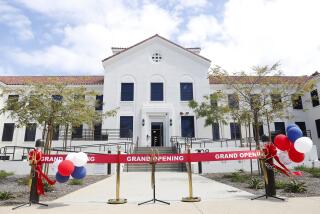When It Comes to Helping the Disabled, the Administration Is All PR Hype : Employment: Federal rules on hiring the disabled have key loopholes that mean business as usual for those who need help in the workplace.
HORTONVILLE, N.Y. — Disability-rights advocates suspected that the Bush Administration was being less than honest in claiming that it was on their side when the President signed the Americans With Disabilities Act this time last year amid much public-relations hype. Equal Employment Opportunity Commission rules announced on the anniversary of the act’s signing last month confirmed those advocates’ suspicions.
These rules--which are final--will let companies avoid hiring a disabled person if the company thinks that particular worker might hurt himself (be “a danger to himself,” is how the rules put it). That’s one of the very things advocates thought the year-old-law was enacted to prevent: allowing employers’ fears and misconceptions about safety to keep disabled people out of the work force. The Supreme Court earlier this year told Johnson Controls that it was illegal to pull a similar version of that trick on women. The Administration, which says it supports disability rights, says it’s OK to tell disabled workers that they’re a danger to themselves or others and to refuse to put them in any job in which a company doesn’t want them.
The EEOC’s rules also do not require an employer to provide assistance for severely disabled workers in using restrooms or eating lunch. Without mandating such assistance, the rules will let companies ignore these fundamental needs of severely disabled would-be workers. For a worker who needs help eating or using the toilet, a company’s refusal to provide such assistance is no different than failing to provide a lunch break or a restroom on the job, period. Those sweatshop conditions were outlawed years ago in this country for non-disabled workers.
People who are deaf, blind or who can’t use their hands can flourish in the white-collar-job world provided their employer accommodates their work style. Computer-voice interfaces, faxes, telecommunications devices for the deaf, phone headsets and other technologies that are practically routine in today’s larger offices can enable even totally paralyzed people to be anything from attorneys and advertising representatives to zoologists and zipper designers. Today’s technology gives disabled people with equivalent educational backgrounds equal ability to compete with non-disabled people; the reason more than two-thirds of working-age disabled people are still unemployed is, therefore, mostly because of discrimination.
Holding down jobs was supposed to be a key reason disabled people were given the protections of the Americans with Disabilities Act. President George Bush himself praised this goal of the law when he signed it. But by refusing to include “personal assistance” requirements in the rules, the Administration is in effect saying that disabled people simply shouldn’t need help with going to the restroom if they’re going to work.
There needs to be an acknowledgment that the work environment is all-encompassing. Women learned, for example, that the road into formerly all-male management bastions often had as much to do with being able to talk over issues informally by the coffeemaker or over a beer after work as with more formal work situations; so, too, people who need personal assistance know that they need to have the option to participate in all levels of work life--and if you have to use the bathroom so desperately you can’t stay on the job eight or more hours, you can’t participate very well.
But help using the restroom is seen as something private--something dirty. By saying it doesn’t have to be provided, the Administration is tacitly saying there’s something wrong with disabled people needing it. Is there? If the Administration believes that, then the Americans with Disabilities Act that it helped devise--which says disabled people’s problems are not their physical conditions, but rather segregation and exclusion--is nothing more than an empty promise.
EEOC staff members are referring to using the restroom as “medical” help. This is absurd and cruel. Just because you need someone to help you, using the restroom is no more “medical” when you’re disabled than it’s “medical” for any of us when we take a break to run to the restroom.
If the Bush Administration had put its rules where its PR on disability rights has been--by insisting that these basic needs be met on the job--we’d all be a lot further along the road toward integrating people with disabilities into our job market. With rules like these, however, there’s little question that the Americans with Disabilities Act’s central promise--to open the doors of business to severely disabled people--will remain unfulfilled.
More to Read
Get the L.A. Times Politics newsletter
Deeply reported insights into legislation, politics and policy from Sacramento, Washington and beyond. In your inbox three times per week.
You may occasionally receive promotional content from the Los Angeles Times.










